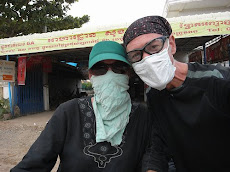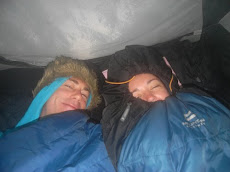
The Germans tend to do things properly and have engineered hundreds of miles of car free cycle lanes, so many in fact that without a map of them all it becomes quite hard not to get lost! In trying to avoid going over the hills which are 1000m high we followed a cycle route along a river valley that in its quest to avoid traffic unfortunately became a cycle tour of light industrial estates and suburbs of the Black Forest - not quite the experience we were seeking! Nethertheless at one point said industrial units came in handy as we sheltered from a storm and one of the men working inside came out to say hello and took us on a guided tour of their precision engineering business. We abandoned the cycle route and took to the hills. It was hard going with hour long climbs up to the top but we were rewarded with the Black Forest experience we had hoped for.

Having gone up in altitude we just seemed to keep going up, looking back and down on the Black Forest and then the snowy peaks of the Alpen loomed into view as we approached Lake Konstanz on the German/Swiss border. After the hills a couple of lovely days was had cycling along the northern lakeshore which is a very beautiful and stylish holiday destination with vineyards, attractive old towns and views across the lake to the snow capped mountains. A friendly German called Bernhard even invited us to camp on his back lawn and join his family for a BBQ. After the lake we set off across southern Bavaria at the foot of the Alps with lots of hills and quiet valleys, where we ran into the low pressure weather system that had been giving the rest of Europe a good soaking and it rained on us for 36 hours non-stop. We passed some beautiful lakes before arriving in Fussen to see crazy King Ludwig's fairytale castles and start our assault on the Alps, crossing into Austria on an ancient mountain pass that today is a minor road closed to traffic.

It took us 9 days to get across the Alps (including a rest day). The scenery was stunning, the air fresh, the water like crystal, the meadows full of beautiful flowers and the quality of everything was excellent. For me it has been the highlight of the trip to date. We stumbled across the Via Claudia August cycle route (www.viaclaudiaaugusta.org) which is an old roman route over the Alps that we were able to to follow the whole way. It took us over 3 mountain passes, the first 1200m and then highest, the Reschen Pass, at over 1500m. Whilst I should probably make out that this was a supreme physical feat of cycling the climbs were not actually as tough as the Black Forest due to the roads being engineered to get lorries over the pass they wind their way up on gentle gradients over 30 miles or so. Nethertheless we were applauded on at the Rechen Pass by a group of Italian road cyclists which was a nice compliment and welcome to Italy. From there it was mostly downhill into a headwind that felt like it blew off the Sahara desert and required vast amounts of delicious ice cream to sustain us. Our route took us along the River Etsch into the Italian Dolomites, where some of the old towns such as Trento were impressive but the valley has been turned over to mile after mile of intensive apple production. After one final killer climb over a pass we travelled down the Brenta valley which was impressive and we cooked dinner in the river valley one night surrounded by hundreds of twinkling fireflies.

The Alps came to an abrupt end and we shot out onto the flat Po Plain and were able to cycle to Venice in a day. The heat and mosquitoes replaced the hills as our main daily challenge. From Venice we went along the coast in search of a beach and a rest but the resorts were uninspiring and expensive so after a refreshing dip in the Adriatic we headed for the Slovenian border and back into the hills and a completely different culture and language. I enjoyed looking over vistas of uninhabited wild forests where bears roamed after the intensively farmed part of Italy we had been in. We visited the caves of Postojna which are truly an amazing natural wonder that put the man made cathedrals of Europe into perspective. Half-way across Slovenia we climbed a pass into the Krka valley which we followed down to its confluence with the Sava River and into the Croatian capital of Zagreb, where we left the EU and had to show our passports for the first time (we hadn't needed them to get into France as the passport people were on strike!).

In Zagreb we stayed in a small apartment in the suburbs and enjoyed city life for a few days before following the River Sava out of the city and on to Belgrade. A journey of 370 miles that took 7 days and included a day and a half detour into Bosnia as the river largely forms the international boundary. There had been almost no mention or evidence of the recent civil war in Slovenia and Croatia so we were surprised one morning as we approached the Bosnia border to come across "Beware Mines" signs along the roadside and then buildings riddled with bullet holes. In Bosnia there are areas with hundreds of bombed out buildings and abandoned homes in villages with slogans on them, assumed vacated by Serbs. It was sobering and somewhat eerie.
Although we only saw 80 miles or so of Bosnia it seemed a poor place in comparison with the rest of Europe. The cars were mostly battered 80's and 90's Escorts, Sierras, etc and the roads potholed. For the first time on the trip we felt affluent rather than poor. The mosques and the turkish coffee were the first indications of how far east we had travelled. We slipped back into Croatia before eventually finding a crossing open to cyclists into Serbia and then through water melon country into Belgrade.
Its fair to say that since leaving Italy there has been a slow decline in the quality of things. The roads (Serbia specialises in potholes), the food and drink, the toilets, the fuel in the vehicles (which we have to breathe!), the standard of driving, etc, etc. At times Serbia has a developing world feel to it. Belgrade tries to sell itself as East meets West but apart from the Orthodox Church and Cyrillic writing there's little of the East about it and it feels truer to say its where developed Europe starts to meet the less affluent world. As we cycled into the centre of the city we passed a shanty village of people living on a rubbish site and its the first place we've been since London where beggars are common. It all feels like a taste of things to come.















No comments:
Post a Comment